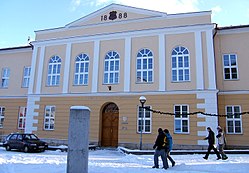
Catholic higher education includes universities, colleges, and other institutions of higher education privately run by the Catholic Church, typically by religious institutes. Those tied to the Holy See are specifically called pontifical universities.
Contents
- History
- List of Catholic institutions of higher education
- Albania
- Angola
- Argentina
- Australia
- Austria
- Bangladesh
- Belarus
- Belgium
- Belize
- Benin
- Bolivia
- Brazil
- Burkina Faso
- Burundi
- Cambodia
- Cameroon
- Canada
- Central African Republic
- Chile
- Colombia
- Congo, Democratic Republic of
- Congo, Republic of
- Costa Rica
- Croatia
- Cuba
- Czech Republic
- Dominican Republic
- Ecuador
- El Salvador
- Ethiopia
- France
- Georgia
- Germany
- Ghana
- Guatemala
- Haiti
- Honduras
- Hong Kong
- Hungary
- India
- Indonesia
- Iraq
- Ireland
- Israel
- Italy
- Ivory Coast (Côte d'Ivoire)
- Jamaica
- Japan
- Jordan
- Kenya
- Korea
- Lebanon
- Liberia
- Lithuania
- Luxembourg
- Macau
- Madagascar
- Malawi
- Malta
- Mexico
- Montenegro
- Mozambique
- Nepal
- Netherlands
- New Zealand
- Nicaragua
- Nigeria
- Pakistan
- Palestine
- Panama
- Papua New Guinea
- Paraguay
- Peru
- Philippines
- Poland
- Portugal
- Puerto Rico
- Qatar
- Romania
- Rwanda
- Senegal
- Sierra Leone
- Singapore
- Slovakia
- Slovenia
- South Africa
- South Sudan
- Spain
- Sri Lanka
- Sudan
- Sweden
- Switzerland
- Taiwan
- Tanzania
- Timor-Leste
- Thailand
- Togo
- Uganda
- Ukraine
- United Arab Emirates
- United Kingdom
- United States
- Uruguay
- Vatican
- Venezuela
- Vietnam
- Zambia
- Zimbabwe
- Academic rankings
- See also
- References
By definition, Catholic canon law states that "A Catholic school is understood to be one which is under control of the competent ecclesiastical authority or of a public ecclesiastical juridical person, or one which in a written document is acknowledged as Catholic by the ecclesiastical authority" (Can. 803). Although some schools are deemed "Catholic" because of their identity and a great number of students enrolled are Catholics, it is also stipulated in canon law that "no school, even if it is in fact Catholic, may bear the title 'Catholic school' except by the consent of the competent ecclesiastical authority" (Can. 803 §3). [1] [ citation needed ]
The Dominican Order was "the first order instituted by the Church with an academic mission", [2] founding studia conventualia in every convent of the order, and studia generalia at the early European universities such as the University of Bologna and the University of Paris. In Europe, most universities with medieval history were founded as Catholic. Many of them were rescinded to government authorities in the Modern era. Some, however, remained Catholic, while new ones were established alongside the public ones. The Catholic Church is the largest non-governmental provider of higher education in the world. Many of them are internationally competitive. According to the census of the Vatican's Congregation for Catholic Education, the total number of Catholic universities and higher education institutions around the world is 1,358. On the other hand, the United States Conference of Catholic Bishops (USCCB) counts it at 1,861. The Catholic religious order with the highest number of universities around the world today is the Society of Jesus with 114. [3]
Like other private schools, Catholic universities and colleges are generally nondenominational, in that they accept anyone regardless of religious affiliation, nationality, ethnicity, or civil status, provided the admission or enrollment requirements and legal documents are submitted, and rules and regulations are obeyed for a fruitful life on campus. However, non-Catholics, whether Christian or not, may or may not participate in otherwise required campus activities, particularly those of a religious nature. [4]
Beyond its academic offerings, a Catholic university or college cultivates an active and engaging community that supports teamwork and creative thinking. By working with different organizations and institutions, the university strengthens its research efforts and expands its influence. It aims to develop graduates who are not only skilled in their disciplines but also socially conscious and prepared to positively impact society.





